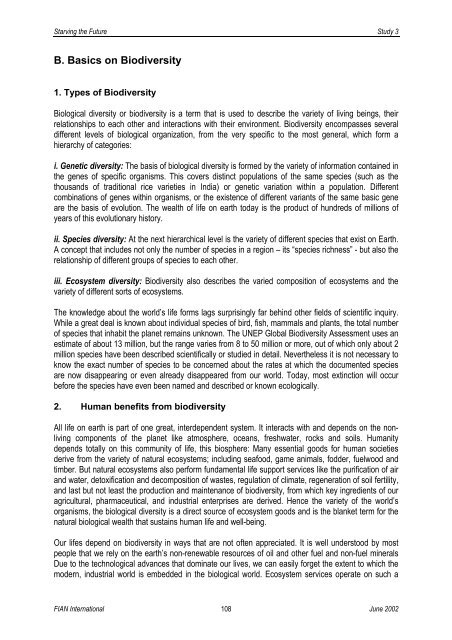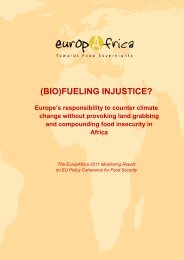Study 3: Ecodestruction and the Right to Food: The Cases of Water ...
Study 3: Ecodestruction and the Right to Food: The Cases of Water ...
Study 3: Ecodestruction and the Right to Food: The Cases of Water ...
Create successful ePaper yourself
Turn your PDF publications into a flip-book with our unique Google optimized e-Paper software.
Starving <strong>the</strong> Future <strong>Study</strong> 3<br />
B. Basics on Biodiversity<br />
1. Types <strong>of</strong> Biodiversity<br />
Biological diversity or biodiversity is a term that is used <strong>to</strong> describe <strong>the</strong> variety <strong>of</strong> living beings, <strong>the</strong>ir<br />
relationships <strong>to</strong> each o<strong>the</strong>r <strong>and</strong> interactions with <strong>the</strong>ir environment. Biodiversity encompasses several<br />
different levels <strong>of</strong> biological organization, from <strong>the</strong> very specific <strong>to</strong> <strong>the</strong> most general, which form a<br />
hierarchy <strong>of</strong> categories:<br />
i. Genetic diversity: <strong>The</strong> basis <strong>of</strong> biological diversity is formed by <strong>the</strong> variety <strong>of</strong> information contained in<br />
<strong>the</strong> genes <strong>of</strong> specific organisms. This covers distinct populations <strong>of</strong> <strong>the</strong> same species (such as <strong>the</strong><br />
thous<strong>and</strong>s <strong>of</strong> traditional rice varieties in India) or genetic variation within a population. Different<br />
combinations <strong>of</strong> genes within organisms, or <strong>the</strong> existence <strong>of</strong> different variants <strong>of</strong> <strong>the</strong> same basic gene<br />
are <strong>the</strong> basis <strong>of</strong> evolution. <strong>The</strong> wealth <strong>of</strong> life on earth <strong>to</strong>day is <strong>the</strong> product <strong>of</strong> hundreds <strong>of</strong> millions <strong>of</strong><br />
years <strong>of</strong> this evolutionary his<strong>to</strong>ry.<br />
ii. Species diversity: At <strong>the</strong> next hierarchical level is <strong>the</strong> variety <strong>of</strong> different species that exist on Earth.<br />
A concept that includes not only <strong>the</strong> number <strong>of</strong> species in a region – its “species richness” - but also <strong>the</strong><br />
relationship <strong>of</strong> different groups <strong>of</strong> species <strong>to</strong> each o<strong>the</strong>r.<br />
iii. Ecosystem diversity: Biodiversity also describes <strong>the</strong> varied composition <strong>of</strong> ecosystems <strong>and</strong> <strong>the</strong><br />
variety <strong>of</strong> different sorts <strong>of</strong> ecosystems.<br />
<strong>The</strong> knowledge about <strong>the</strong> world’s life forms lags surprisingly far behind o<strong>the</strong>r fields <strong>of</strong> scientific inquiry.<br />
While a great deal is known about individual species <strong>of</strong> bird, fish, mammals <strong>and</strong> plants, <strong>the</strong> <strong>to</strong>tal number<br />
<strong>of</strong> species that inhabit <strong>the</strong> planet remains unknown. <strong>The</strong> UNEP Global Biodiversity Assessment uses an<br />
estimate <strong>of</strong> about 13 million, but <strong>the</strong> range varies from 8 <strong>to</strong> 50 million or more, out <strong>of</strong> which only about 2<br />
million species have been described scientifically or studied in detail. Never<strong>the</strong>less it is not necessary <strong>to</strong><br />
know <strong>the</strong> exact number <strong>of</strong> species <strong>to</strong> be concerned about <strong>the</strong> rates at which <strong>the</strong> documented species<br />
are now disappearing or even already disappeared from our world. Today, most extinction will occur<br />
before <strong>the</strong> species have even been named <strong>and</strong> described or known ecologically.<br />
2. Human benefits from biodiversity<br />
All life on earth is part <strong>of</strong> one great, interdependent system. It interacts with <strong>and</strong> depends on <strong>the</strong> nonliving<br />
components <strong>of</strong> <strong>the</strong> planet like atmosphere, oceans, freshwater, rocks <strong>and</strong> soils. Humanity<br />
depends <strong>to</strong>tally on this community <strong>of</strong> life, this biosphere: Many essential goods for human societies<br />
derive from <strong>the</strong> variety <strong>of</strong> natural ecosystems; including seafood, game animals, fodder, fuelwood <strong>and</strong><br />
timber. But natural ecosystems also perform fundamental life support services like <strong>the</strong> purification <strong>of</strong> air<br />
<strong>and</strong> water, de<strong>to</strong>xification <strong>and</strong> decomposition <strong>of</strong> wastes, regulation <strong>of</strong> climate, regeneration <strong>of</strong> soil fertility,<br />
<strong>and</strong> last but not least <strong>the</strong> production <strong>and</strong> maintenance <strong>of</strong> biodiversity, from which key ingredients <strong>of</strong> our<br />
agricultural, pharmaceutical, <strong>and</strong> industrial enterprises are derived. Hence <strong>the</strong> variety <strong>of</strong> <strong>the</strong> world’s<br />
organisms, <strong>the</strong> biological diversity is a direct source <strong>of</strong> ecosystem goods <strong>and</strong> is <strong>the</strong> blanket term for <strong>the</strong><br />
natural biological wealth that sustains human life <strong>and</strong> well-being.<br />
Our lifes depend on biodiversity in ways that are not <strong>of</strong>ten appreciated. It is well unders<strong>to</strong>od by most<br />
people that we rely on <strong>the</strong> earth’s non-renewable resources <strong>of</strong> oil <strong>and</strong> o<strong>the</strong>r fuel <strong>and</strong> non-fuel minerals<br />
Due <strong>to</strong> <strong>the</strong> technological advances that dominate our lives, we can easily forget <strong>the</strong> extent <strong>to</strong> which <strong>the</strong><br />
modern, industrial world is embedded in <strong>the</strong> biological world. Ecosystem services operate on such a<br />
FIAN International 108<br />
June 2002
















